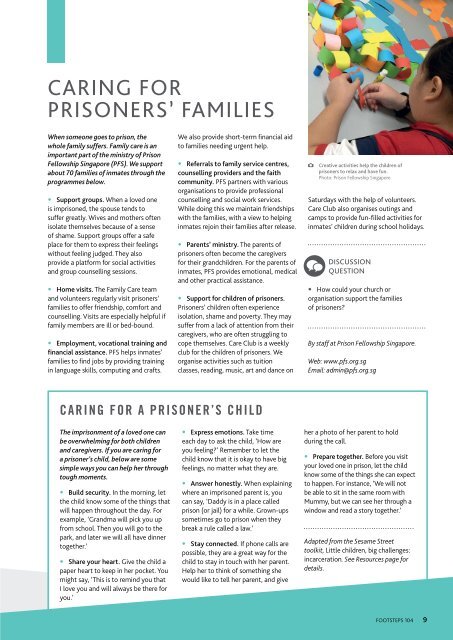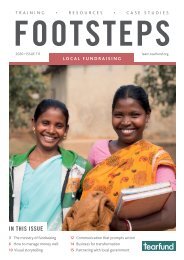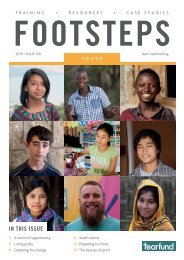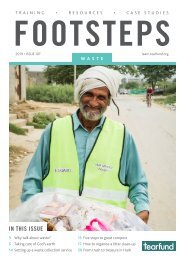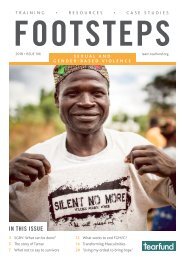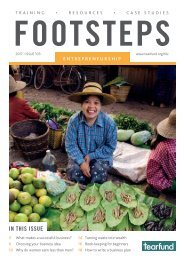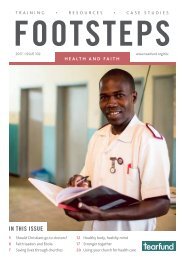Footsteps 104: Prisons
Footsteps 104 features practical tips for getting involved in prison ministry and caring for ex-offenders.
Footsteps 104 features practical tips for getting involved in prison ministry and caring for ex-offenders.
Create successful ePaper yourself
Turn your PDF publications into a flip-book with our unique Google optimized e-Paper software.
CARING FOR<br />
PRISONERS’ FAMILIES<br />
When someone goes to prison, the<br />
whole family suffers. Family care is an<br />
important part of the ministry of Prison<br />
Fellowship Singapore (PFS). We support<br />
about 70 families of inmates through the<br />
programmes below.<br />
••<br />
Support groups. When a loved one<br />
is imprisoned, the spouse tends to<br />
suffer greatly. Wives and mothers often<br />
isolate themselves because of a sense<br />
of shame. Support groups offer a safe<br />
place for them to express their feelings<br />
without feeling judged. They also<br />
provide a platform for social activities<br />
and group counselling sessions.<br />
••<br />
Home visits. The Family Care team<br />
and volunteers regularly visit prisoners’<br />
families to offer friendship, comfort and<br />
counselling. Visits are especially helpful if<br />
family members are ill or bed-bound.<br />
••<br />
Employment, vocational training and<br />
financial assistance. PFS helps inmates’<br />
families to find jobs by providing training<br />
in language skills, computing and crafts.<br />
We also provide short-term financial aid<br />
to families needing urgent help.<br />
••<br />
Referrals to family service centres,<br />
counselling providers and the faith<br />
community. PFS partners with various<br />
organisations to provide professional<br />
counselling and social work services.<br />
While doing this we maintain friendships<br />
with the families, with a view to helping<br />
inmates rejoin their families after release.<br />
••<br />
Parents’ ministry. The parents of<br />
prisoners often become the caregivers<br />
for their grandchildren. For the parents of<br />
inmates, PFS provides emotional, medical<br />
and other practical assistance.<br />
••<br />
Support for children of prisoners.<br />
Prisoners’ children often experience<br />
isolation, shame and poverty. They may<br />
suffer from a lack of attention from their<br />
caregivers, who are often struggling to<br />
cope themselves. Care Club is a weekly<br />
club for the children of prisoners. We<br />
organise activities such as tuition<br />
classes, reading, music, art and dance on<br />
Creative activities help the children of<br />
prisoners to relax and have fun.<br />
Photo: Prison Fellowship Singapore<br />
Saturdays with the help of volunteers.<br />
Care Club also organises outings and<br />
camps to provide fun-filled activities for<br />
inmates’ children during school holidays.<br />
DISCUSSION<br />
QUESTION<br />
••<br />
How could your church or<br />
organisation support the families<br />
of prisoners?<br />
By staff at Prison Fellowship Singapore.<br />
Web: www.pfs.org.sg<br />
Email: admin@pfs.org.sg<br />
CARING FOR A PRISONER’S CHILD<br />
The imprisonment of a loved one can<br />
be overwhelming for both children<br />
and caregivers. If you are caring for<br />
a prisoner’s child, below are some<br />
simple ways you can help her through<br />
tough moments.<br />
••<br />
Build security. In the morning, let<br />
the child know some of the things that<br />
will happen throughout the day. For<br />
example, ‘Grandma will pick you up<br />
from school. Then you will go to the<br />
park, and later we will all have dinner<br />
together.’<br />
••<br />
Share your heart. Give the child a<br />
paper heart to keep in her pocket. You<br />
might say, ‘This is to remind you that<br />
I love you and will always be there for<br />
you.’<br />
••<br />
Express emotions. Take time<br />
each day to ask the child, ‘How are<br />
you feeling?’ Remember to let the<br />
child know that it is okay to have big<br />
feelings, no matter what they are.<br />
••<br />
Answer honestly. When explaining<br />
where an imprisoned parent is, you<br />
can say, ‘Daddy is in a place called<br />
prison (or jail) for a while. Grown-ups<br />
sometimes go to prison when they<br />
break a rule called a law.’<br />
••<br />
Stay connected. If phone calls are<br />
possible, they are a great way for the<br />
child to stay in touch with her parent.<br />
Help her to think of something she<br />
would like to tell her parent, and give<br />
her a photo of her parent to hold<br />
during the call.<br />
••<br />
Prepare together. Before you visit<br />
your loved one in prison, let the child<br />
know some of the things she can expect<br />
to happen. For instance, ‘We will not<br />
be able to sit in the same room with<br />
Mummy, but we can see her through a<br />
window and read a story together.’<br />
Adapted from the Sesame Street<br />
toolkit, Little children, big challenges:<br />
incarceration. See Resources page for<br />
details.<br />
FOOTSTEPS <strong>104</strong><br />
9


